2022-02-18


Q1:The word ‘Metaverse’ has recently sparked intensive discussions and debates in the culture and tourism industry. We notice that a handful of businesses in China have announced their resolve to have a big go at it. However, people feel somewhat underwhelmed by some of those plans that were made public on the Internet, as they seem rather like the same old wine in a new bottle — vaguely familiar and short on substance. Do you think the Metaverse is just another concept that is being overhyped?
JIANG Lieyi:We all witnessed the lively discussions lately around the concept of Metaverse. First of all, it should be made clear that there hasn’t been an “official” definition or interpretation of this neologism. I think at its simplest, the Metaverse refers to the future world where the divisions between real life and cyber space are blurred. It may also be seen as a combination of virtualized reality and tangible virtuality. I wouldn’t say that the Metaverse is merely conceptual. With progress being made from day to day, correlative new products and feasible solutions have been delivered based on today’s technological conditions. The introduction of the Metaverse to the culture and tourism business is very promising, and it will most certainly trigger profound changes in the industry.
ZHANG Xiaoming:I don’t think we should reduce the talks over the Metaverse to a hype if we realize what is really happening behind the scenes — on one hand, there have been attempts at the new economic restructuring; on the other, there is new capital trying to build up their market shares. I am not an expert in this domain, but for reference I would like to share a few of my thoughts that were gained from my everyday readings lately.
First, until recently most development and breakthroughs around the concept of Metaverse appear in the online leisure and entertainment business. Of course, there is room for the culture and tourism industry to get involved, but let’s look into what the consequences of such engagement could be. Could it be that the tourism consumption being stimulated by the tech-driven improvement of the travel experience, or that the culture and tourism businesses becoming overly dependent on the IT technology and Internet economy? These are something we ought to think about.
Second, the Metaverse technology, in terms of its hardware conditions, is not quite ready. Although some advocates, like Mark Zuckerberg, feel optimistic that wearable devices will become exceedingly lightweight and easy to use in only about a decade, the real challenge comes from the ability of “embodied cognition” that humankind had developed millions of years ago. As long as people are still aware of any device external to their own bodies, the ideal state of thorough “immersion” will not be achieved.
Third, in terms of the software conditions, the Metaverse technology is not mature enough either, and this immaturity is expected to last– with the most important reason being that the human ability of continuous perception allows no blank in the perceived “reality”. In the settings of the Metaverse, what a person feels as an avatar is always restricted to the programmed (or in another word, realized) reality where blank may occur at any time. To understand this, we should regard each individual person, especially when being a “tourist” with more physical and mental freedom, as a subject with unique motivation and behavioral patterns that are not completely predictable. What an individual person wants to “do” and is capable of “doing” are far beyond the imagination of any programmer who is no more than an ordinary member of the humankind themselves. Besides, other than vision and hearing, many indispensable components of personal experience for tourism such as the sensations of taste, smell and touch, cannot be effectively simulated in the Metaverse.
Q2:Speaking of the application of the Metaverse concept to the culture and tourism business under the current technological conditions, what do you think are the most promising scenarios?
ZHANG Xiaoming:Let’s take a look at it from both “positive” and “negative” perspectives.
From a positive perspective, as a new means that enriches tourism experiences, the Metaverse will certainly be of use to the culture and tourism industry. In this regard, what the developers need to do is to establish an “outlook of a universe” on the basis of the AR / VR / MR technologies that have made great progress over the past few years, that is, to build a “story scene” interconnected as opposed to fragmented and incoherent. For example, the museums in China may jointly build their Metaverse, in which the MR game or virtual interaction with a historical figure relevant to a certain collection in Museum A may derive a network that connects many other collections, and the historical figures behind them, in Museum B, C and D. In such a manner, fascinated museum visitors will be drawn to a hunt for ancient treasures in a virtual world grander than the reality itself. Furthermore, the experience of the virtual world does not necessarily end even after the visitors leave the museum. An assortment of apps, carefully designed for their portable devices, will serve as lasting stimulation that will help them, in a subtle but effective manner, make up their minds for the next trip.
From a negative point of view, I think the trade could also take advantage of the immaturity of the Metaverse technology to benefit the promotion of real-life travel experiences. This idea is certainly different from the norm, but haven’t we all heard of the saying that “the Pipa can also be played well when held upside down behind the back”? I always believe, at least in the foreseeable future and in compliance with physical / mental health and laws, that what human beings are able to perceive is far beyond what the Metaverse is able to present.
Furthermore, we humans have the capability to form perceptual transformation, compare, identify and develop special fondness for certain things. Differentiation will occur in public opinions on the Metaverse when more and more people have gained experience in the differences between the reality created by the technologies which is limited and that of the real life which is infinite. Eventually, new generations of travelers with stable preferences for the natural world will emerge. The prerequisite here is that, by that time there will still be chance for people to experience nature and travel far rather than to be completely immersed or even locked-up in the virtual world since their childhood. This shows, I should add, that young kids must be given ample opportunities to travel, not necessarily by way of study tours.
JIANG Lieyi:I think the introduction of the Metaverse will soon generate a number of innovative culture and tourism products that deliver brand new experiences. Looking back into our own practice at the Future Plus over the recent years, we’ve identified the following scenarios in which the application of Metaverse show evident prospects:
1. The “Joyride (Yueqi) VR”, a patent product of ours developed three years ago provides a Cycling experience in a realistic virtual world. It allows users to “ride around the world without having to leave the room”. It also provides a platform for multi-person competitions and a shared virtual travel experience. It is now one of our most popular products.
2. We developed a digital solution for culture and tourism presentation based on Huawei Cyberverse technology that creates 3D scene simulations, through which users can watch virtual representations of historical scenes on their smart phones and enjoy an enhanced cultural experience in real time.
3. In 2019, we launched a project together with the Chinese Society on the Research of the Figures in the History of the Chinese Communist Party to create “8K-3D digital portraits for the founders of the new China”. Up to now, we have completed digital images of ultra-high precision for about 50 personages. Down the road, a Long March themed digital space for immersive culture experience based on the concept of Metaverse, which will be the first of its kind in China when completed, is under construction and scheduled to be put into use by 2022. Taking advantage of the momentum of the red tourism (tourism based on the revolutionary history of CPC) and the construction of the Long March National Culture Park, this new project provides tourists with a fresh, immersive and interactive experience through digital recreation of the history.
Q3:What suggestions would you give to those who are about to jump at the opportunities brought along by the Metaverse?
JIANG Lieyi:The Metaverse is already in the process of kicking off a new era, the ball is rolling and there is no coming-back. I believe the earlier the trade and individuals act on the innovative application of the Metaverse, the faster the development in such regard will achieve, and the greater their chances will be to benefit from their investment. But we should also stay rational as the Metaverse sets a high threshold with cross-application of multiple cutting-edge technologies, which requires accumulation of knowledge and technologies over long time. There isn’t a single business on the market capable of building up all links on the chain of the Metaverse by itself. Therefore, cooperation on the basis of complementary advantages is our best chance to promote timely adaptation of the Metaverse concept in our business .
ZHANG Xiaoming:Although the impact brought by the Metaverse on the society, culture and whole economy can’t be fully accessed just yet, it is wise of our culture and tourism business to take greater caution. I think “tourism” in its classical sense refers to a voluntary experience of an “alternative life at somewhere else”. However, the first thing the Metaverse advocates is “de-territorialization”, or in another word, an experience not related to anywhere else. It promises a possibility that everyone could create their own “alternative life experiences” anywhere, anytime, 24/7.Consequently, the significance of “space” is dissolved, and the “somewhere else” on which the entire concept of tourism used to rely becomes rather irrelevant.
In this sense, I think all “tourism participants”, both the businesses and individual tourists, should remain alert to the whole concept of the Metaverse. We must see that even before the concept was brought to the center of public discussions, the intrusion upon tourism activities had already been in progress as various lifestyle apps, entertainment software and social media based on the Mobile Internet technologies find their way into people’s everyday lives. Leisure time is always limited, and the time spent on traveling somewhere else is usually the first to be compromised.
I want to conclude on a positive note. Maybe we should regard the Metaverse as the “icing on the cake” that helps in improving the experience of “living somewhere else” which is ultimately what the culture and tourism business has to offer, rather than a drop-in guest who divides the cake and claims the largest slice, if not the whole thing.
